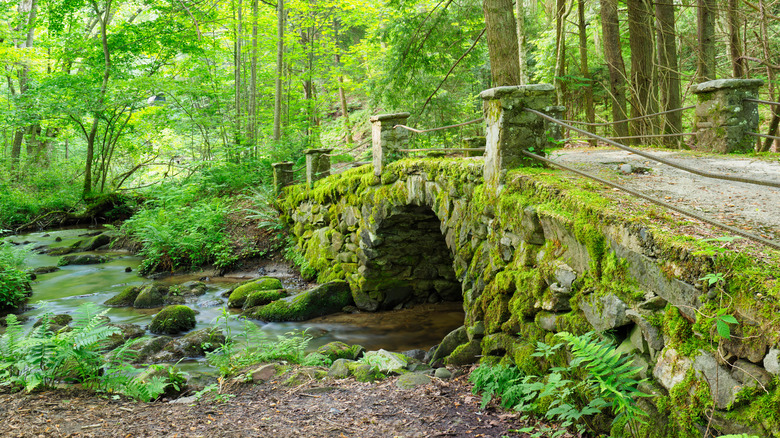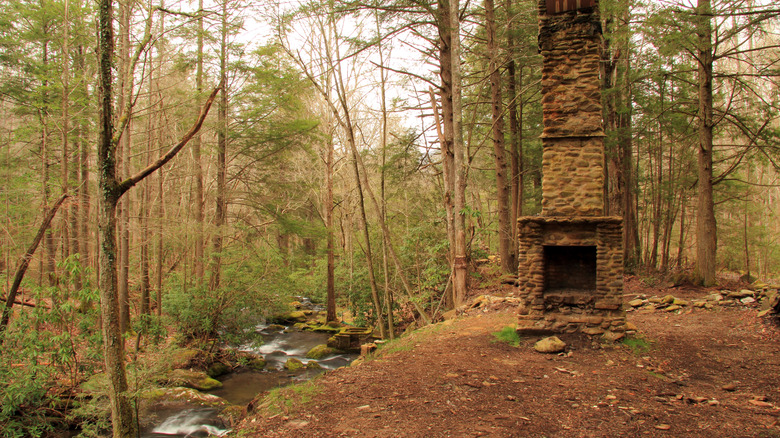A Once-Thriving Smoky Mountain Resort Town Now Is An Eerie Gem With Abandoned Cabins And Serene Trails
When it comes to the complete list of every national park in America, the Great Smoky Mountains National Park tops it as one of the most visited every year. According to National Park Service data, around 13 million people visited the Great Smokies in 2023, in comparison to Grand Canyon National Park, the second-most visited, with just under five million visitors. This makes Elkmont, Tennessee, a ghost town deep in the Great Smokies, a curious study.
Elkmont, established circa 1840 as Little River, was a thriving logging town and resort area when the town and its environs were designated a national park in 1934. Long-time members of several mountain clubs in the area, such as the Appalachian Club, were instrumental in preserving the land as a national park. When the park was established, these residents were given the option of selling or leasing their cabins (for a lifetime lease that eventually expired in 1992) in Elkmont. The town continued to attract visitors, especially to the Wonderland Hotel, which hosted many events and became a club of its own (eventually public). However, the last full-time resident left the town in the 1990s. Which begs the question: Why did Elkmont fail in one of the most-visited parks in the nation?
Abandoned cabins in the forest of Great Smoky National Park
Most of the best-preserved and most photographed ghost towns in the United States are ruins of mining shanty towns in the West or famous abandoned sites. However, the Great Smokies have a few ghost towns, like Lost Cove, reachable only by a strenuous hike, and Proctor, one of the "underwater ghost towns of Appalachia," now mostly submerged in Fontana Lake. Lost Cove's last resident moved out in 1957 when the railroad and logging industries collapsed (the town was never reachable via paved road); Proctor was flooded due to a new dam in the area. However, the reasons behind the eventual abandonment of Elkmont are less straightforward.
Many of the leftover cabins seem surprisingly intact, while all that's left of some cabins is a stone chimney. The reason for this mix of preserved buildings and ruins is due to a compromise between the National Park Service (NPS) and the National Register of Historic Places (NRHP). After the NPS declined the renewal of leases on Elkmont cabins in the 1990s, the NRHP swooped in and placed 49 of Elkmont's structures on their list. This was controversial, as the park initially refused to perform upkeep on these structures, leaving them to crumble back into the forest. In 2009, an agreement was reached, and 19 of the listed structures were slated for restoration, with the rest either doomed to demolition or ruin. Both ruins and restored cabins — with the 19th cabin finished in 2024 — can now be visited or even rented for events, like the restored Appalachian Clubhouse.
Serene, scenic trails in the Great Smokies
Elkmont, this tiny Tennessee town hidden in the Smokies, is no longer a resort town, but it's still close to Elkmont Campground and some of the most beautiful landscapes of the national park. Staying in Elkmont Campground gives you access to some of the area's best trails, as well as the eerie buildings of Elkmont Ghost Town. Elkmont Campground is just eight miles from Gatlinburg, Tennesee, a gateway town to the Smokies. Elkmont Ghost Town is a short walk from the campground's parking lot. Scenic, serene trails lead from Elkmont to secret waterfalls, rushing creeks, mountain peaks, and plenty of forest views. Hike along Jakes Creek or Little River to see some remaining chimneys and visit the charming Elkmont Troll Bridge. The 80-foot-high Laurel Falls is also a short hike from the campground.
Elkmont is magnificent in the autumn when the trees burst into vivid red, orange, and yellow hues. The most crowded time around Elkmont Campground is during the famous synchronous firefly event in May and June when a certain species of local fireflies synchronize flashing patterns as a mating ritual. Tickets for the event are sold lottery-style and sell out months in advance, so long-term planning is necessary.


